By Katie Emmett, Training and Education Manager
Burns services around the UK have been adopting the LymphaTouch in their clinics for the treatment and management of burns scars.
Samantha Bennett is an Advanced Burns Physiotherapist based at Whiston Regional Burn Centre and The Katie Piper Foundation Rehabilitation Centre for scarring. Samantha is involved in scar management and the ongoing rehabilitation process following burns. Samantha presented a case study on the benefits of using negative pressure for scar management.
The patient is a 36-year-old male, who was involved in an explosion at work where he suffered significant burns injuries. The patient's initial management included multiple theatre visits and split skin/meek grafting. The patient’s left leg remained a problem due to the exposure of the left Achilles tendon.
Case Study Focus: Left Lower Limb
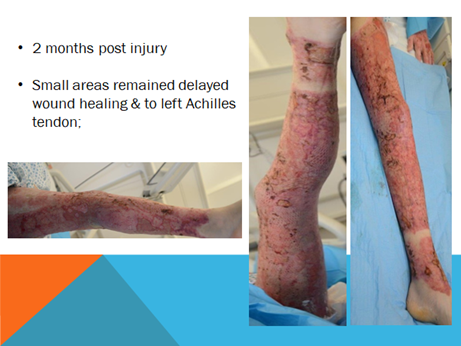
Samantha used a scar assessment tool (POSAS) 3 months post injury to begin the next stage of his treatment.
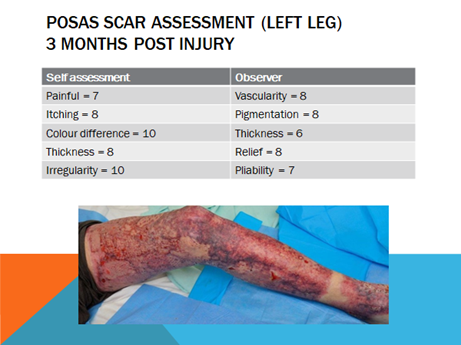
Samantha started to implement a scar rehabilitation programme for her patient that included:
-
Stretches and Exercises
-
Pressure Garments
-
Positive Pressure Therapy
-
Emollients and Silicone
-
Negative Pressure Therapy - LymphaTouch
The main indications for using LymphaTouch:
-
Significant tethering to his scaring, specifically around the upper thigh
-
Adhesions which restricted his range of movement
-
Reduced elasticity
-
Reduced pliability
-
Hypersensitivity – the patient was distressed with the injury
-
Neuropathic pain which included itching, nerve pain into his legs
-
Significant oedema to the left lower foot and ankle
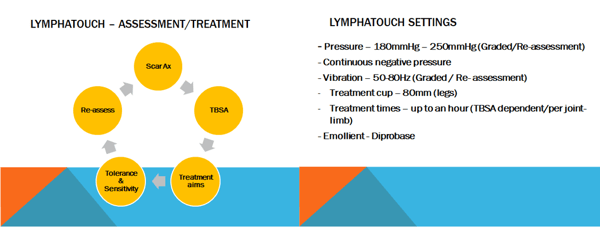
-
Daily treatment sessions for 4 weeks (Monday to Friday)
-
Weekly sessions for 2 months
-
Legs / hands
-
Treatment to adjacent areas – (caution areas)
-
Static & Dynamic use
Results
Initial observations:
1. Improved hydration
2. Increase in localised erythema
3. Improvement in elasticity/flexibility
Patient outcomes:
1. Reduction in pruritus
2. Reduction in hypersensitivity
3. Improvement in skin pliability
4. Improvement in range of movement
Samantha used the scar assessment tool (POSAS) 8 months post injury review his results.
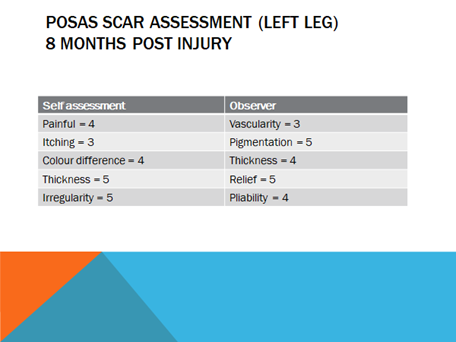
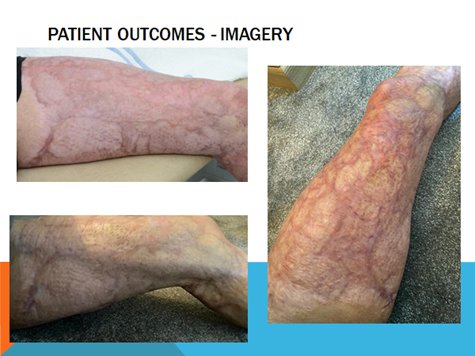
Conclusion to using LymphaTouch for the management of scarring:
-
Utilise in combination with a plethora of treatment for scar management -Anecdotal evidence of improvement in pruritus and pliability
-
Supports lymphatic drainage
-
Combination of static and dynamic limb positioning
-
Non-invasive pain free treatment
-
Positive patient feedback
Samantha continues to support patients from the acute setting through to the rehabilitation stage. This has been an invaluable part of her development and understanding of how the lifelong impact that burns scars have upon survivors and how therapy can have a substantial difference in the long term. LymphaTouch has certainly helped Samantha and many other clinicians across the UK to achieve the best possible results for their patients.
Watch the full webinar below:
